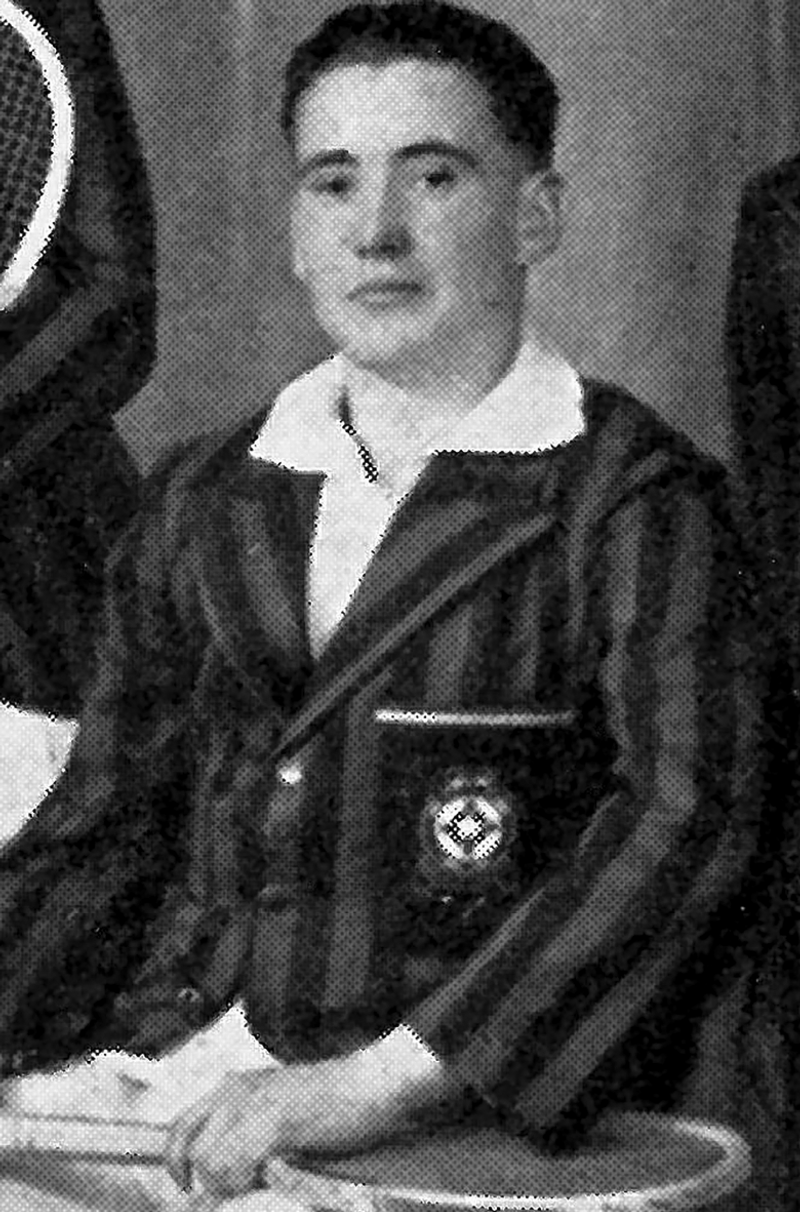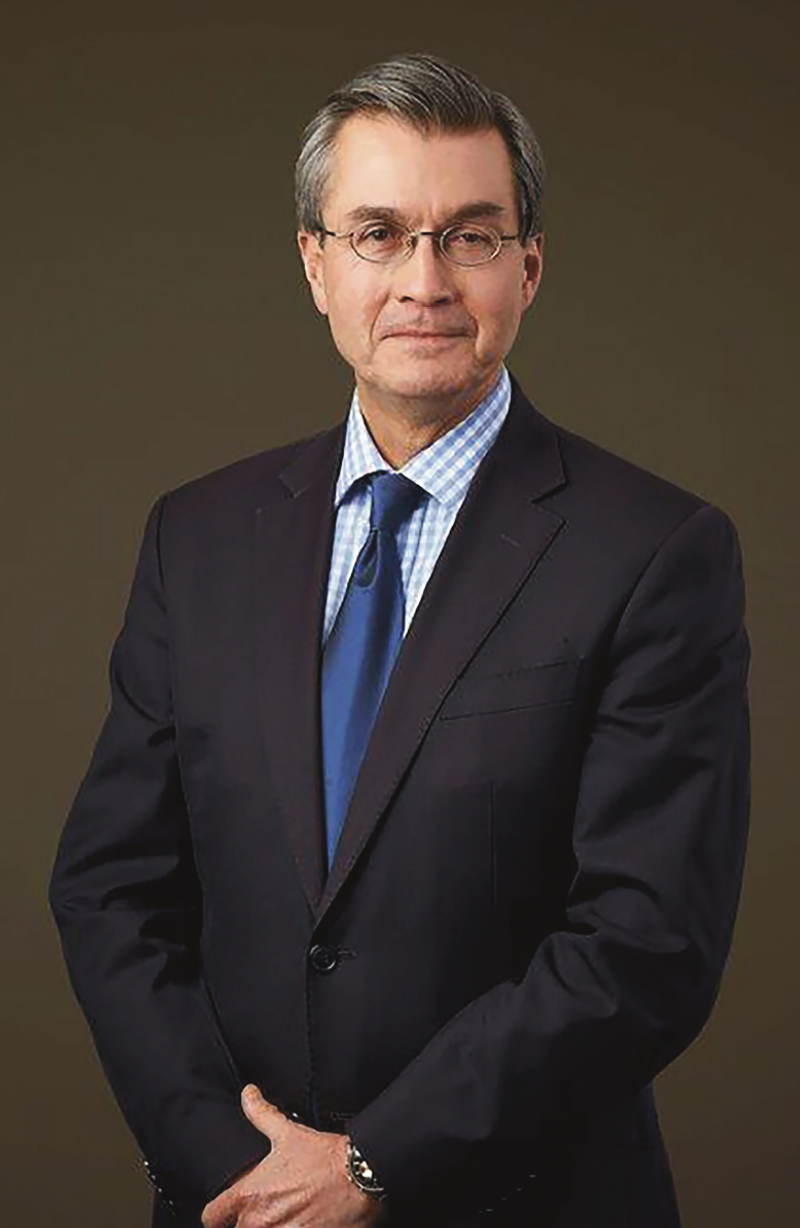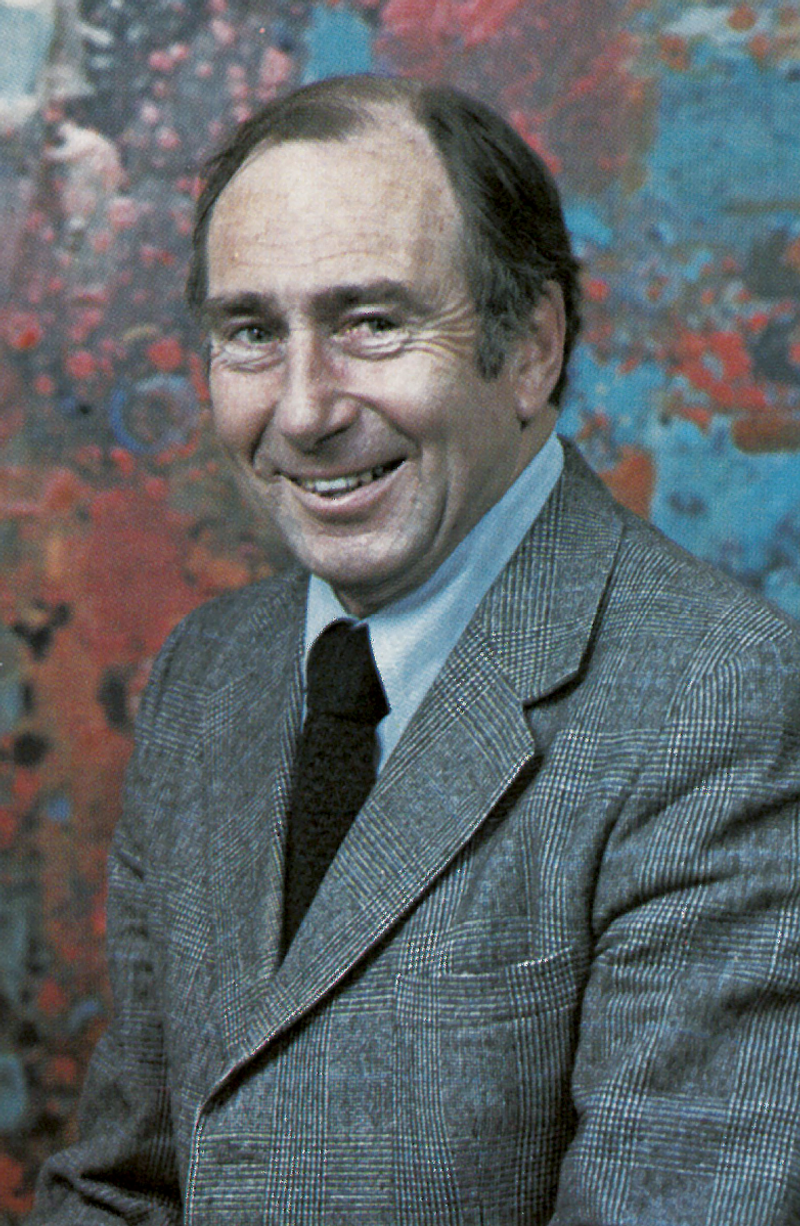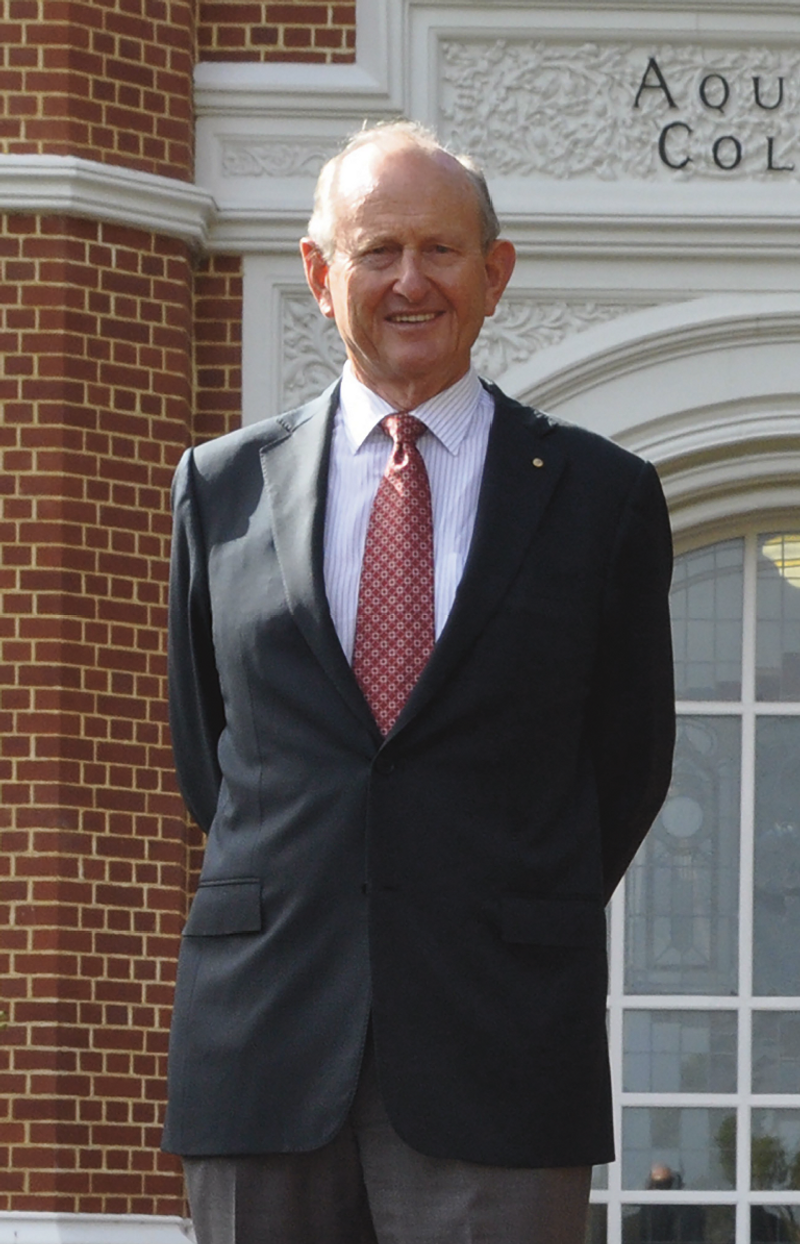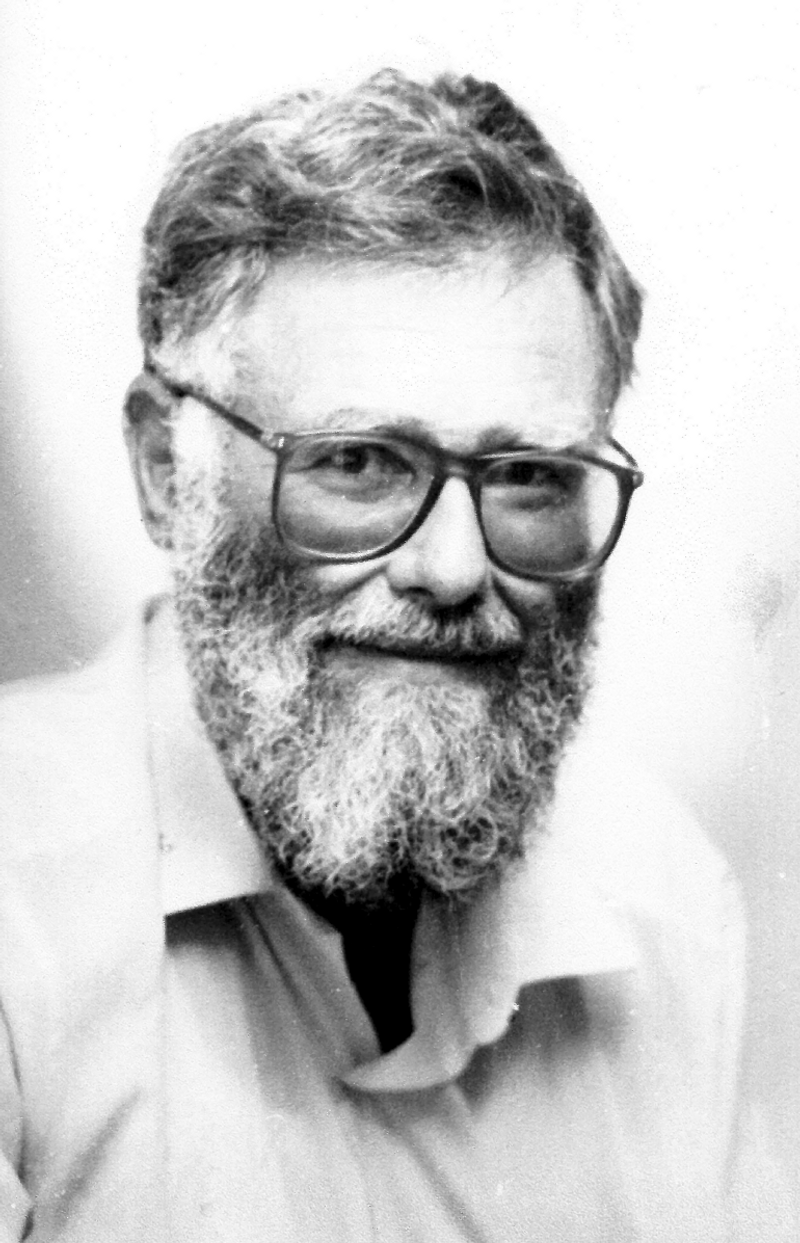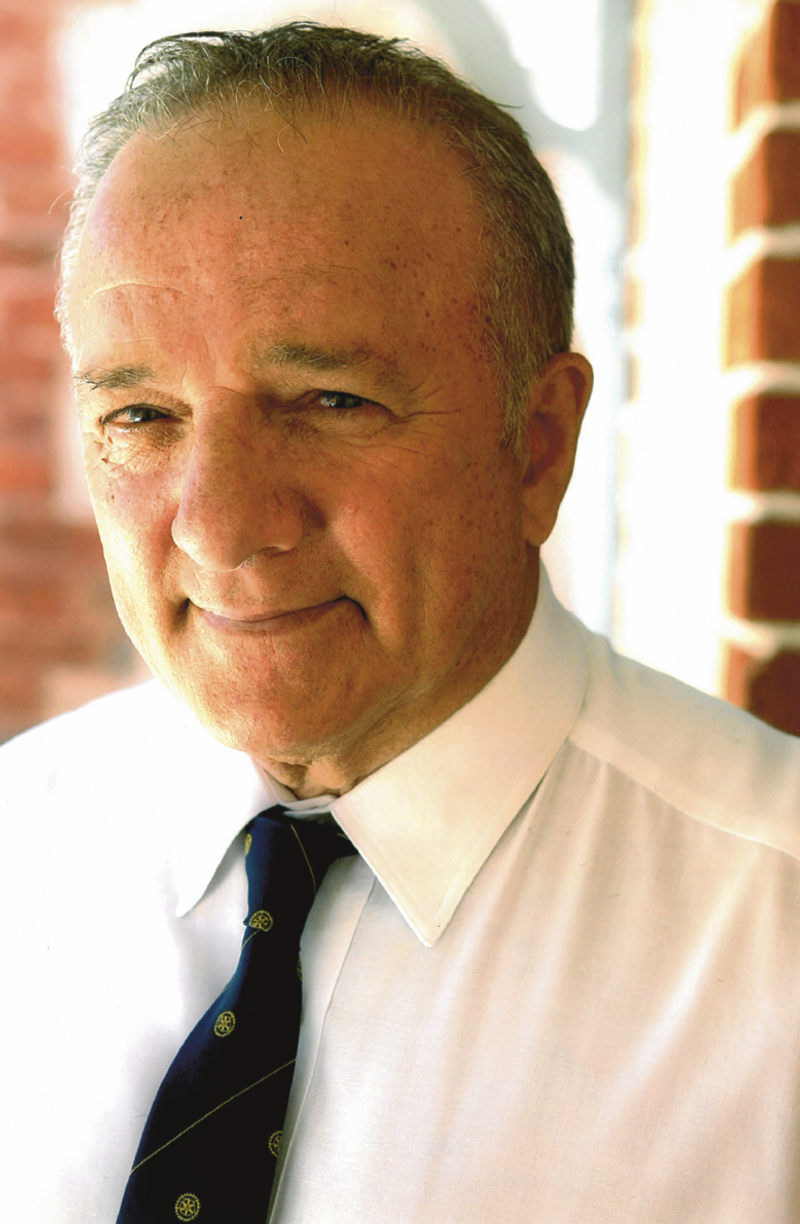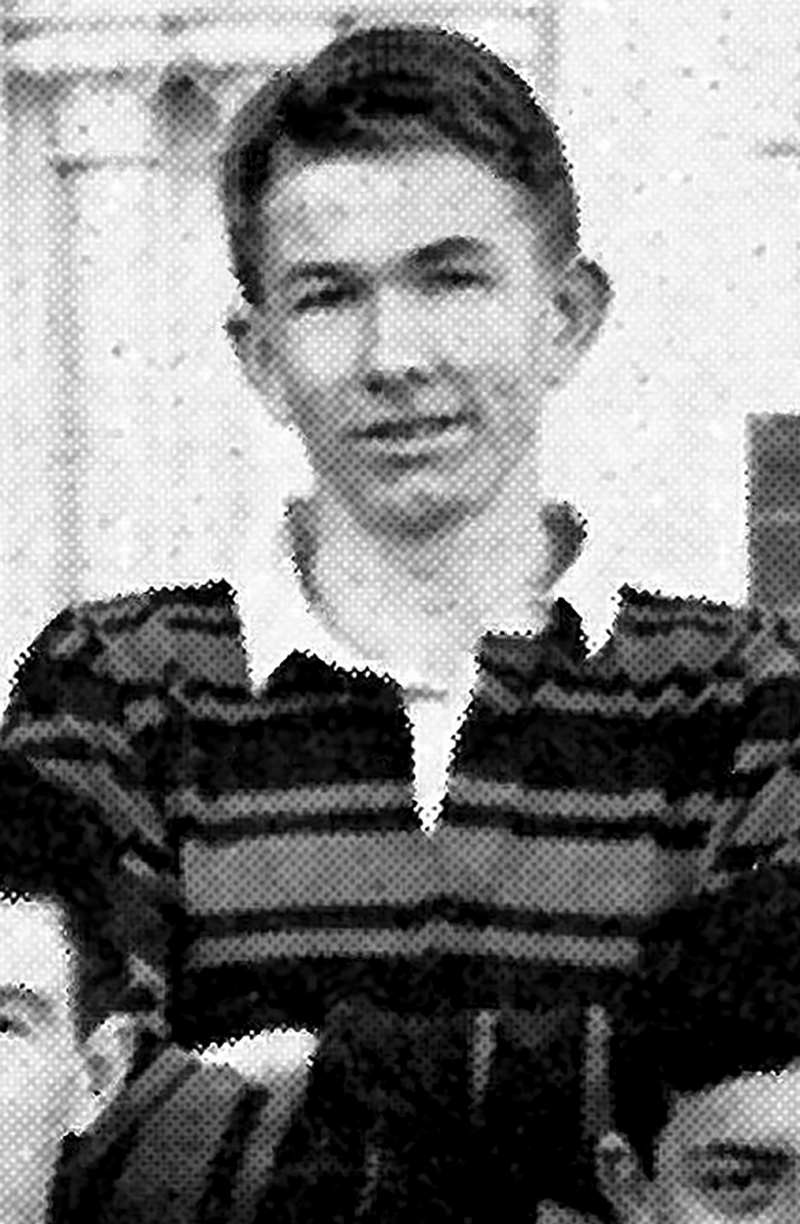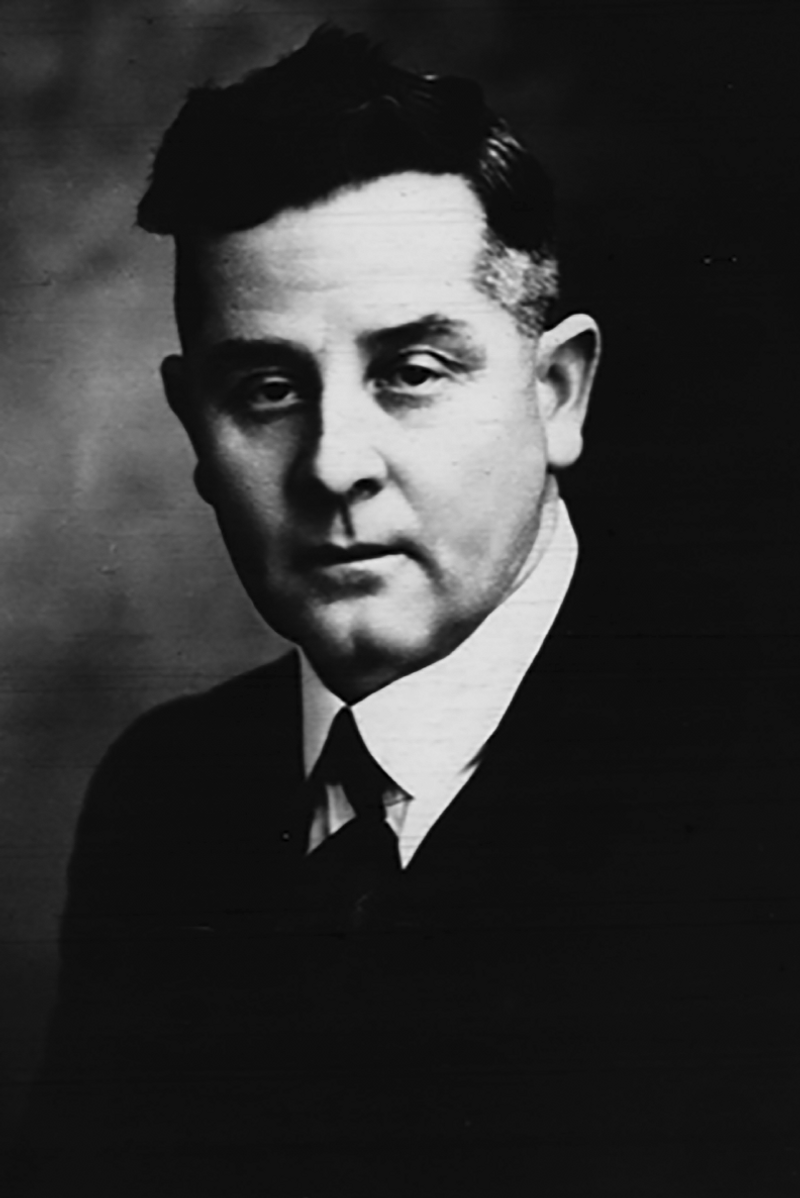Contact
Pat Prendiville
Class of 1940
Pat Prendiville was the patriarch of one of the great pioneering families of West Australia. He provided the foundation of values on which the Prendiville business empire has been built. He was also one of the few students to experience Christian Brothers’ education at both “The Terrace” and what was then the new Aquinas College campus.
The Prendiville gene pool is synonymous with good all-around sporting ability and Pat features heavily in the old victory photos of the First Eleven and the First Eighteen as well as swimming, hockey and golf, his life-long passion. He boarded at the school from 1936 until 1940 when he left as Prefect.
Originally from Castleisland, County Kerry, Pat’s father Pat Garrett Prendiville was one of a family of fourteen! Following in the tradition of the day Pat went on to have eleven children having married Paddy Malloch in 1953. In 1965 Pat bought and ran the iconic Balladonia Roadside hotel on the Eyre Highway. When his eldest son Peter was 12 in 1966 he remembers going to the sheep station for holidays there: “We’d be up at 4 am and sweep the driveway and be driving tankers and dozers from an early age. We rode horses and mustered sheep it was a great upbringing”. Paddy made sure dinner was on the table for a family of eleven nightly, plus hangers-on.
Swimming training began at 5 am and after a full day’s schooling at Aquinas there would be cricket or tennis training.
He built up quite an empire as a publican eventually owning roadhouses, a sheep station, and fuel service stations including some well-loved historic sites, such as the Cocklebiddy Roadhouse on the Nullabor and later the Windsor in Perth.
Pat was a very keen golfer who regularly won awards such as the Mt Lawley Cup. He also has a hole dedicated to him in the “the World’s Longest Golf course” which reaches across the Nullarbor. His hole is called Skylab after the satellite which was the first US space station to fall to earth in July 1979. A space scientific research station, it fascinated the world in the daily news of the late 1970s as everyone wondered where it would land. It came crashing down in pieces scattered around the Balladonia Roadhouse, causing the US President Jimmy Carter to phone the Balladonia to apologise for any inconvenience.
Pat was endowed with a great sense of service and regularly sent one of his numerous family to look after someone less well off than his own clan. After a lifetime of success in business very sadly he passed away at the respectable age of 96 in 2019. Those who remember him well say of him that he was a principled, quiet man who led by example and who possessed a strong faith. He was loved by a great many and commanded the respect of all who knew him.
Anthony Power
Class of 1975
Anthony, or Tony as he is better known, was born on the same day as Queen Elizabeth II of a poor Irish policeman and a Chinese mother. His father left Ireland and moved to Palestine at the end of WWII and later moved to Hong Kong to work for the Royal Hong Kong Police Force. There was a great deal of travel right from the start for Tony who was born in Edinburgh as a direct result. Both parents came from large families of 11 and incredibly both were number five in the family running order. Growing up in the privileged Hong Kong expat community, Tony spent a lot of time holidaying in Ireland. But by the time he was 16 he was fluent in Cantonese. It wasn’t until his second last year of secondary school that his parents decided to relocate to Perth and Tony entered Aquinas College in Year 11.
He arrived to find a completely different culture and set of life conditions. Gone was the privileged upbringing and freedom of Hong Kong. However, he found Aquinas College a very welcoming place and one that changed his perspective on life completely. He says: “there was an innate sense of honesty about the people and Aquinas had an impact on me. It gave me a sense of belonging to something.”
After graduation, Tony studied Law at UWA, where he met his wife Jane. He joined Jackson McDonald Lawyers starting out in litigation but was naturally curious and found different types of law stimulating. He said: “you need to be prepared to work hard. It’s a lifestyle decision to be a lawyer and you need to be creative. I think you need to have a good sense of what is right and wrong, and that is what I got from Aquinas.”
Tony was elected to the Bar and joined Francis Burt Chambers in 1999. He worked in nearly all courts and tribunals as well as the Corruption and Crime Commission and Royal Commissions. He is an Adjunct Professor at the University of Notre Dame and Murdoch University, where he teaches trial advocacy. He is also a strong mentor to many across all levels of the legal profession.
On 1st May 2018, Local Government Minister David Templeman asked Tony to hold an Inquiry into the City of Perth. In a typically modest style befitting of the best Aquinians he says they picked him: “because I came across as impartial and thorough”. He is driven by a firm belief that it is important to restore confidence in the City of Perth. Retrospectively, Tony says of his time at the College: “there were things I didn’t like but, whether or not you like it, I am grateful for those lessons.”
Tom Perrott AM
Class of 1938
Tom Perrott was born the second of five children in Perth of an Irishman from Cork who stepped off the boat in 1913, and mother Kathleen Delaney who hailed from Fremantle. Study did not come easily to Tom but he made up for what he lacked academically with stellar performances on the field. A strong runner he also played in the 1st XI and the 1st XVIII. Leaving as a Prefect, Tom’s contribution to both sports gets many mentions in the Annual of that year. He returned to the Terrace to finish his studies before joining his father’s business. Probably today we would say he was dyslexic, but it didn’t hold him back. He left school as a great storyteller and able in accounting.
Tom arrived in time to catch a huge wave of need for his skills in WA, in decorative and commercial painting and he smelt the opportunity. Tom could sell: he worked hard and developed really sharp business acumen. In 1957 Tom, an entrepreneur like his father, took over the family business now named DC Perrott and Son. Six years later after 40 years of trading, it included Gardner Brothers of Melbourne. He arrived at the perfect time to build a profitable business, Perth was growing fast and the need for his services was strong. Soon he was running an international firm Gardner Perrott Group with more than 1,200 employees. In 1986 it was named WA Company of the Year and he was awarded WA Citizen of the Year.
Tom was blessed with a very strong faith and indeed he had contemplated entering the priesthood while spending a year in the Novitiate of the Jesuits until ill health forced him to return to Perth. Michael, his son, remembers him saying the rosary as he drove them to school in a ute carrying a full load of paint tins in the back. Only a near-crash along the way would stop him reciting long enough to vent at some poor driver who crossed his path, before continuing where he left off without missing a line.
Tom was a member of the St Vincent de Paul Society for 65 years and a central figure in coordinating Pope John Paul II’s visit to Perth. As well as being a major driver of commerce in the state, a member of the Confederation of WA Industry, his philanthropic contributions to the community were phenomenal. He was a founding member of Southern Cross Homes, president of the WA Society for Crippled Children, founding member of the Child Accident Prevention Foundation, the Diabetes Research Foundation and he chaired the Channel Nine Appealathon Foundation. In 1982 he was recognised with an Order of Australia for his service to disabled children and was awarded the Centenary Medal in 2001 for service to the community and commerce. Another great payoff for his considerable skills and love of cricket was to be president of the WACA from 1990 to 1998.
Michael Perrott AM
Class of 1963
Michael Delaney Perrott’s family history and that of Aquinas College are inextricably linked. His father Thomas was a student at CBC on the Terrace in 1938 and one of the founders of Perth’s business community throughout the early part of the last century. Michael continued his father’s work, inherited his faith and his love of cricket all in the spirit of the school his family still has ties to with generations carrying on the family tradition and attending Aquinas College.
Both Michael’s parents were born in Australia, grandfather Perrott having brought his painting business from Cork’s High Street, all the way from Ireland. It became generationally successful for both the Perrotts and WA. Like his father, Michael’s journey has embraced a sense of community, strong faith, successful marriage and incidentally, excellence in cricket and commerce.
In his leaving year Michael was Prefect, College Captain, won titles at the State Athletics Championships and Honours for his ability in cricket, football and athletics. Michael left Aquinas and graduated with a Bachelor of Commerce from UWA before being called to join the armed forces. He contemplated a career with the Church but decided, having met his match in Rhonda, that family should come first. He joined his father’s painting business, on returning from Melbourne in 1971, and over the next 18 years helped expand it into an international company. His commercial interests have spanned as many as 40 enterprises over several decades.
Michael’s ability to play cricket is a skill he has passed on to generations of Aquinians. He coached the 1st XI in 1981-82, 1984 and 1985. His return to his alma mater was not confined to the cricket pitch as he also chaired the Aquinas College Board for a decade from 1985.
He was made a Member of the Order of Australia in June 2008 for services to “mental health, suicide prevention and further education”. The driver behind his external success is strong faith. He and Rhonda are motivated by a sense of spirituality that encompasses faiths of the world, but always finds a home in the Catholic Church. In a prayer he wrote for his 50th Wedding Anniversary, his words sum up the spirit of the school: “In this changing world we pray for all people and ask for the wisdom to be an example befitting our talents”.
Geoffrey Summerhayes

Geoff was the son of one of Perth’s most famous architects. He travelled from Mosman Park to Salter Point on three buses every day to get to Aquinas.
By his own admission, not a huge scholar, Geoff found he excelled at Maths and Music. He was also in the cadets, the Radio Club and played Rugby in the 1st XV. Geoff felt a sense of belonging at Aquinas. He found his marks improved and it was a very happy time.
After leaving he went to Curtin where he graduated with a Bachelor’s Degree, Business Administration and Management and then studied at the University of NSW for a post-graduate management qualification.
While at Curtin he experimented, setting up a windsurfing franchise and a sail making business. He became Captain of the local yacht club; then segued into nightclubs, learning a great deal about general management along the way. In growing his entrepreneurial skillset Geoff probably did not realise how relevant this experience was to become.
He was hired by international construction and property company Lendlease with a brief to find opportunities for growth. Geoff was assigned Development Manager on Sydney’s Darling Park project and then with the re-zoning of Pyrmont Peninsula into a multi-use zone. Having made a success of both he was asked to breathe life into MLC, one of their financial services companies, which was subsequently sold to NAB. He was poached to become the CEO of Suncorp Life.
When someone with the ability sees a financial institution through a crisis like the “GFC” they just keep climbing. In spite of his plan at the time to take time off, he was hired onto the Board of APRA, the Australian Prudential Regulation Authority. In this role, he has behaved like a true Aquinian and found a way to change the world for the better.
Geoff has been the first Australian regulator to make a public comment on the financial risks of climate change and has confronted the world with the cost of ignoring it. It is his intention to move the debate away from ethics and towards finance.
His legacy will be a fresher, more forward-looking APRA, and one that makes the organisation successful for the next 20 years. But looking back he attributes a great deal of what he has achieved to his start at Aquinas College. It instilled in him a sense of purpose and knowing right from wrong: “a sense of identity about who I was and what I had to contribute.”
Br “Barry” Paton
Class of ‘53
Not often in the history of the school did a talented pupil decide to dedicate his life’s work to the brotherhood which educated him, but James “Barry” Paton is one who did. Above-average but not outstanding, especially at sport, Jim was a member of the class of ‘53. It was not for long however as he dramatically announced to his family that he had decided at the mere age of 14 to become a Christian Brother. His father, who was not a Catholic, was very far from impressed but admirably vowed he would never stand in his way.
So it was to be that Jim found himself one of the youngest ever teacher trainees from the Brothers’ training college in Strathfield in Sydney, only four years later, to teach for the first time at CBC Wakefield St in Adelaide. During a rare visit to see him at work in the role, the sight of the newly named “Brother Barry” throwing himself into his work and coaching the under 10s and 11s in cricket won his father over. Finally, his father gave him his blessing on his chosen career.
After four years in Yarraville, Melbourne he was posted back to Leederville in Perth for nine years and was reunited with his family on a more regular basis. The complete conversion to the Brotherhood was apparent to his younger brother, who, ten years earlier had lost a huge role model. Brother Barry spent very many years in Papua New Guinea but returned to Perth and passed away in 2009.
Those who knew him, most often refer to the manner of the man: “genial: easy to get on with”. A quality that surely made him a great teacher. Another was his ability to spar intellectually with his students. He would often take the contrary view to put them through their paces, mentally. Those who knew him say Brother Barry was not the best-organised person and other than swimming, not a sportsman. But from a young age, he felt a strong calling to follow his path and become a Christian brother. Another oft mentioned quality was “his care and concern for those people less accepted by others”. Brother Barry changed many students’ lives and possessed a “deep calm”, which many attributed to his faith: “He was a true “Brother” at heart.”
Victor Paino AM
Class of 1955
Victor was the son of Sicilian immigrant Salvatore Paino who arrived from the island of Fulcudi in 1911. He opened Fremantle Fish Supply in Fremantle in 1926. Salvatore believed education was the key to success and so he and his wife sacrificed many of life’s luxuries and worked a 7-day week so he could afford to send his boys to good schools. Salvatore was determined that they would have things he never did. “The best thing my father ever did for me,” says Victor “was to send me to Aquinas. The worst thing he ever did for him dropped him off at school in the old blue ute that was followed by hordes of flies who were attracted by the stench of fish". He can laugh about it looking back. Victor recalls it was a very hard life.
While his older brother was being conscripted to fight for Australia in WWII, Salvatore was interred as an Italian Prisoner of War in Harvey in 1940. Despite the fact that Salvatore had become an Australian citizen in 1920. At the age of only 15, Victor was plucked from Aquinas to join his father’s business.
Although by his own admission, not Aquinas’ finest academic, Victor is arguably one of its finest entrepreneurs. His business sense drove the family business to become the multi-million dollar enterprise that is Sealanes today. He widened the product line to include small goods and much-needed ships’ supplies to a growing port that dominated Australia’s western seaboard. Before long, his customers had upgraded from local shoppers to navies and commercial shipping. Anyone who arrived by ship in the 1950s needed to restock and so he supplied them with the best. He lived through the arrival of refrigeration, but before it came ships had an even greater need of fresh produce. Prestigious customers used his company, such as Queen Elizabeth II’s Royal Yacht Britannia on a trip to Australia.
Victor left the business 14 years ago and publically he takes no credit for the company’s success. If you ask him he will tell you that “I was very, very lucky and many people helped me”. It is his way to deflect the glory to others. He attributes his strong work ethic to his parents and the education they worked so hard to provide him. He was given the Member of the Order of Australia in 2018 for significant services to the seafood retailing industry, to ship supply services, and to the community through support of charitable groups such as Rotary and the Fremantle Hospital.
Michael O’Driscoll
Class of 1967
Mike O’Driscoll is an Aquinian whose chosen subject arrived at a time when it was most needed. He studied psychology and specialised in bullying in the workplace, work-life balance, stress and burnout. Organisational psychologists have them all in the spotlight, as do educationalists, and will do for some time.
Mike comes from a long line of O’Driscolls who once ruled part of the south of Ireland, before setting out for new futures on the west coast of Australia. His father Eugene was a geologist who had been taught at Christian Brothers College Perth. Mike very sadly lost his mother at a young age. The family moved to Perth from Adelaide in 1963 and Mike went to Aquinas from 1966-67. He thoroughly enjoyed the teaching, in particular Brother Woodruff’s maths class and Brother Warner’s Latin class. He left in 1967 with the Latin prize, as a sergeant in the cadets and having played with the First XV rugby team. He described Aquinas as a “tremendous atmosphere where people were encouraged to do their best, an inspiring place”.
His younger brother Peter was a much-loved and respected Christian Brother who sadly died very young in 2001. A strong spiritual streak ran through the O’Driscoll family as Mike himself joined an order, the Passionists, after school while starting university in Sydney. He transferred to Melbourne and then withdrew from the order feeling a need to learn more about life.
Mike enrolled in Psychology at UWA in 1971 and graduated three years later. He continued with study, completing his PhD in Psychology at Flinders University in Adelaide in 1978. Mike was employed as a lecturer by the University of Papua New Guinea from 1979 to 1981 before a challenging role came up at Waikato University in New Zealand.
As Mike found his natural home in the ranks of New Zealand’s academia, a new science was being born: organisational psychology, previously known as industrial psychology. At Waikato University he established a teaching program in Organisational Psychology, including a specialist Master’s degree, and led research on stress and well-being in the workplace. He was made Professor of Psychology in 2000, and also was head of the department for nine years.
Mike’s impressive career is peppered with awards: the New Zealand Psychological Society Jamieson Award in Organisation Psychology (2014), the Vice Chancellor’s Medal for Staff Excellence (2016) and the Waikato Lifetime Research Excellence Award (2017). He has over a hundred publications in academic and professional journals and over 90 presentations at conferences over thirty-five years. Mike has supervised many PhD and Masters students and is widely published on stress in the workplace, bullying and work-life balance.
Mike has a son and daughter. Looking back, he believes Aquinas gave him a sense of commitment, a logical approach to problem-solving and a strong motivation to be successful.
Emil Nulsen
Class of 1903
Emil Nulsen came to Christian Brothers’ College at the turn of the 20th century and became the first Member of Parliament to have been educated by the Brothers. He was also arguably one of the Christian Brothers’ great and possibly most colourful characters.
Emil was an outstanding all-rounder at the school: Champion Athlete of 1902, highly skilled at rowing, running, football and cricket where, as a fast bowler, according to The West Australian: “he secured many wickets”. On leaving Aquinas, he returned to help his father in mining during the great gold rush.
However, his passage through life was not as smooth as one might imagine before he became a highly regarded and much-loved politician. At the age of 19, his father, who had mining interests in New England, had to lodge a lease in person with the warden in Wiluna within 24 hours, sixty miles away. He sent Emil to get it there before closing time, but tragically, only a few miles into the journey his horse keeled over and died. Not to be denied, the plucky Emil took off on foot: both running and walking as fast as he could. He had less than a day to do it with no help from modern technology, not even a bus! Champion athlete of 1902 stood him in good stead for the task and, exhausted and hungry, he successfully delivered the papers with 90 minutes to spare, securing the lease for his brother, his father and himself. The Lawlers to Sandstone cycling record is his to this day at 14.1mph. He was also regarded as the local boxing champion. Emil went on to become a respectable farmer and businessman in the Salmon Gums area before setting out on his next career, politics.
Happily, his journey from there to Kanowna MLA and Minister for Justice and Railways in 1939 and again as MLA for Eyre in 1953, as Minister for Justice and Health was relatively straightforward. A home for disability services was named after him in 1956 and went on to become the biggest provider for the disabled in the state. He was also the first politician with a pilot’s license, which came in handy for an electorate spanning 213,000 square miles and reaching as far as the South Australian border.
